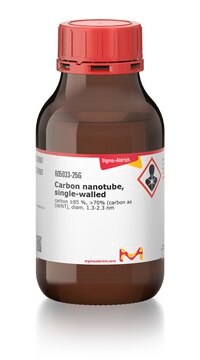755710
Carbon nanotube, single-walled
>70% (TGA), avg. no. of layers, 1
Synonyme(s) :
SWCNT
About This Item
Produits recommandés
Niveau de qualité
Pureté
>70% (TGA)
Forme
powder
Caractéristiques
avg. no. of layers 1
Fabricant/nom de marque
Nanocyl, Inc.
Taille, L
× 3 μm , TEM
Diamètre moyen
2 nm
Pf
3652-3697 °C (lit.)
Densité
1.7-1.9 g/cm3 at 25 °C (lit.)
Chaîne SMILES
[C]
Vous recherchez des produits similaires ? Visite Guide de comparaison des produits
Catégories apparentées
Description générale
Application
Notes préparatoires
Informations légales
Code de la classe de stockage
11 - Combustible Solids
Classe de danger pour l'eau (WGK)
WGK 3
Point d'éclair (°F)
Not applicable
Point d'éclair (°C)
Not applicable
Faites votre choix parmi les versions les plus récentes :
Déjà en possession de ce produit ?
Retrouvez la documentation relative aux produits que vous avez récemment achetés dans la Bibliothèque de documents.
Les clients ont également consulté
Articles
Boron nitride nanotubes (BNNT) are close structural analogs of carbon nanotubes (CNT), which are high aspect ratio nanotubular material, where carbon atoms are alternately substituted by nitrogen and boron atoms.
Carbon nanomaterials (CNMs), such as single-walled carbon nanotubes (SWCNTs), multi-walled carbon nanotubes (MWCNTs), and graphene (Figure 1), have diverse commercial applications including lighter and stronger composite materials, improved energy storage devices, more sensitive sensors, and smaller transistors.
Carbon nanomaterials (CNMs), such as single-walled carbon nanotubes (SWCNTs), multi-walled carbon nanotubes (MWCNTs), and graphene (Figure 1), have diverse commercial applications including lighter and stronger composite materials, improved energy storage devices, more sensitive sensors, and smaller transistors.
Carbon nanotubes (CNTs) have received much attention since their discovery in 1991 by Sumio lijima1 due to their excellent mechanical, electrical, and optical properties.
Protocoles
Single-Walled Carbon Nanotubes synthesized by the Super-Growth Method & their properties & applications, including dispersing SGCNTs, SGCNT-polymer composites & SGCNT-metal composites are discussed.
Notre équipe de scientifiques dispose d'une expérience dans tous les secteurs de la recherche, notamment en sciences de la vie, science des matériaux, synthèse chimique, chromatographie, analyse et dans de nombreux autres domaines..
Contacter notre Service technique



